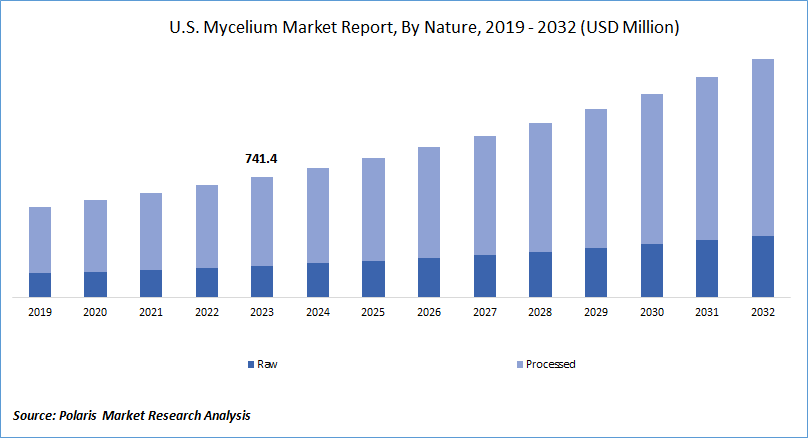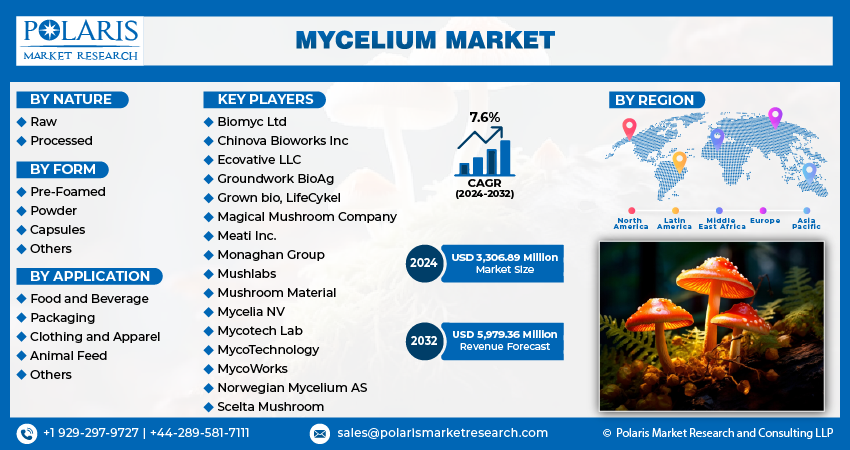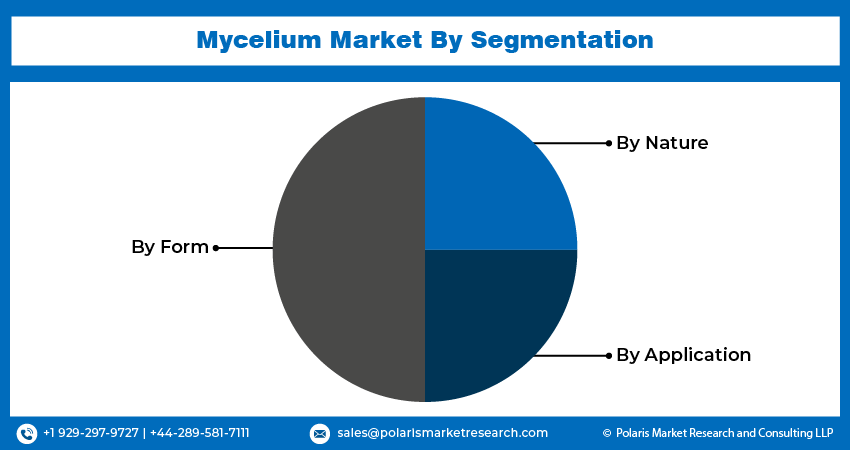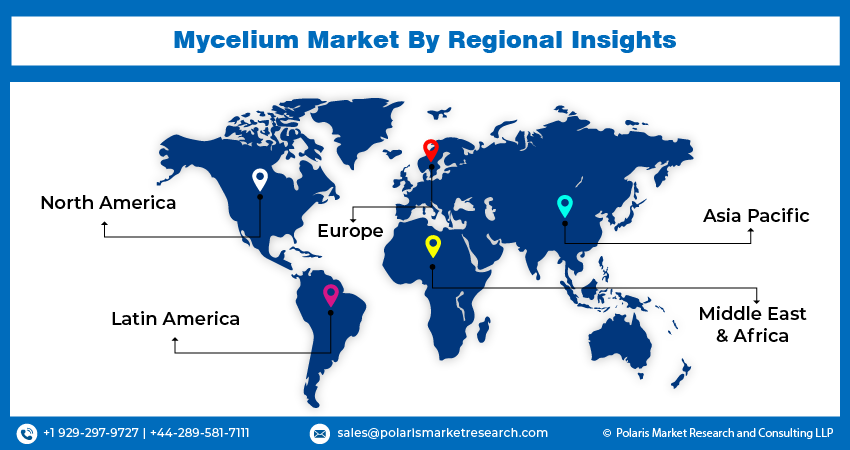
Mycelium Market Share, Size, Trends, Industry Analysis Report
By Nature (Raw, Processed); By Form; By Application; By Region; Segment Forecast, 2024 - 2032
- Published Date:Feb-2024
- Pages: 120
- Format: pdf
- Report ID: PM3007
- Base Year: 2023
- Historical Data: 2019-2022
Report Outlook
The global mycelium market was valued at USD 3,082.48 million in 2023 and is expected to grow at a CAGR of 7.6% during the forecast period.
A mycelium is a network of fungal filaments that be same as hyphae. Mycelia are found growing underground or on rotting tree trunks. A single spore can give rise to a mycelium, which can then produce the fruiting bodies of fungi such as mushrooms. Mycelium allows the fungi to spread over vast areas. In Oregon, USA, the Blue Mountains are home to mycelium fungus that covers ten square kilometers, making it the largest organism in the world.
Beyond its ecological significance, mycelium showcases tremendous potential in diverse industries. It has been harnessed to create fire-resistant, robust, and lightweight building materials, mirroring the texture and functionality of leather for the fashion sector, and even serving as a bonding agent for materials such as bricks in specific applications. Nevertheless, the mycelium industry is still in its early stages.

To Understand More About this Research: Request a Free Sample Report
As consumer preferences shift towards plant-based diets and veganism, there is a growing interest in mycelium-based products. The global mycelium market offers significant opportunities, particularly in increasing investments in mycelium research and development. Moreover, mycelium's versatile qualities make it adaptable for various uses, paving the way for its adoption in industries such as healthcare, construction, electronics, and skincare products.
Growth Drivers
Growing Demand of Mycelium in Packaging Industry
Mycelium-based biodegradable packaging has emerged as an innovative and sustainable solution that is garnered significant attention within the packaging industry. Recent studies indicate that mycelium-based materials can offer properties like those of polystyrene, making them versatile for various applications, including organic plastics and even furniture. Its lightweight nature and ease of molding and production make it an ideal material for packaging, especially for shipping and delivery. Additionally, the affordability of raw materials and disposal costs position mycelium as a promising tool to address future environmental concerns.
Mycelium, characterized by its root-like structure composed of thread-like branches, can be harnessed to create an array of sustainable materials, spanning clothing, food, construction, and packaging. This versatile substance has even been used in the production of items like leather and plant-based edibles, serving as an eco-friendly alternative to traditional plastics. Mycelium's malleable nature enables it to take on various shapes, making mycelium foam a versatile choice in the packaging industry.
Major e-commerce players like Amazon, eBay, and Etsy, famous for their extensive carbon footprints, have faced criticism, particularly in the context of product packaging. Environmental impact in this area has been a pressing concern. As a result, there is a substantial consumer demand for waste reduction and more sustainable packaging materials, such as mycelium-based packaging.

Report Segmentation
The market is primarily segmented based on nature, form, application, and region.
|
By Nature |
By Form |
By Application |
By Region |
|
|
|
|
To Understand the Scope of this Report: Speak to Analyst
By Nature Analysis
Processed Mycelium Dominated the Global Market in 2023
Processed mycelium emerged as a dominant segment accounting for 74.36% of the overall revenue share in 2023. Processed mycelium, on the other hand, refers to raw mycelium that has undergone specific treatments and procedures to achieve desired characteristics or forms. Processing techniques can include methods such as drying, heat treatment, chemical treatments, and molding. These processes can be used to create mycelium-based materials with specific shapes, sizes, and properties.
Processed mycelium can be molded into various forms, making it suitable for applications including packaging, construction materials, and even consumer goods. During processing, mycelium can be combined with other organic materials or additives to enhance its durability, strength, and suitability for particular applications. Processed mycelium products often undergo rigorous testing to ensure they meet quality standards and can perform effectively in their intended uses.
One of the key driving factors behind the rise of the mycelium market is its sustainability. Mycelium grows on organic waste, making it a renewable and readily available resource. It can be cultivated in controlled environments using agricultural by-products such as straw, sawdust, or even waste materials such as corn husks and rice hulls. This ability to utilize waste materials not only reduces the environmental impact but also contributes to the circular economy by transforming agricultural leftovers into valuable products.
By Form Analysis
Pre-formed Segment Accounted for the Largest Market Share in 2023
Pre-formed segment accounted for 37.63% of overall revenue share in 2023. The pre-formed mycelium market has been gaining traction in recent years, offering innovative and sustainable solutions in various industries.
One of the driving factors behind the growth of the pre-formed form in mycelium market is the increasing demand for sustainable alternatives in packaging, construction, and consumer goods industries. Businesses and consumers are increasingly recognizing the environmental impact of traditional materials and are turning to mycelium-based products due to their biodegradability and minimal ecological footprint. The versatility of pre-formed mycelium products is another key factor contributing to market expansion. These products can be molded into various shapes and sizes, making them suitable for applications ranging from protective packaging and insulation to decorative items and furniture components.
Additionally, the growing awareness of the importance of circular economies and eco-friendly practices is propelling the adoption of pre-formed mycelium products. As consumers become more eco-conscious, industries are exploring sustainable materials such as mycelium to align their production practices with environmentally responsible standards. Furthermore, ongoing research and development initiatives are enhancing the production processes and expanding the range of applications for pre-formed mycelium, further fueling the market's growth.

Regional Insights
Europe Region Dominated the Market in 2023
Europe led the global market with a revenue share of 41.55% in 2023 and is expected to maintain its dominance over the anticipated period. Mycelium, the vegetative part of fungi, has gained prominence as a promising alternative to traditional materials like plastic and leather. In Europe, various companies have been pioneering the development of mycelium-based products, including packaging materials, textiles, and even meat substitutes. This trend aligns with the region's strong commitment to environmental sustainability and a circular economy, making mycelium an attractive choice for businesses and consumers seeking greener alternatives.
The North American market is witnessing a significant rise in demand for products made from natural sources. Consumers are increasingly seeking clean, sustainable, and environmentally friendly alternatives across various industries. This trend is closely linked to the growing awareness of the impact of traditional manufacturing processes on the environment. As a result, the demand for mycelium, a naturally occurring and sustainable material, is on the rise, especially in the food and beverage industry.

Key Market Players & Competitive Insights
The Mycelium market is fragmented and is anticipated to witness competition due to several players' presence. Major service providers in the market are constantly upgrading their technologies to stay ahead of the competition and to ensure efficiency, integrity, and safety. These players focus on partnership, product upgrades, and collaboration to gain a competitive edge over their peers and capture a significant market share.
Some of the major players operating in the global market include:
- Biomyc Ltd
- Chinova Bioworks Inc
- Ecovative LLC
- Groundwork BioAg
- Grown bio
- LifeCykel
- Magical Mushroom Company
- Meati Inc.
- Monaghan Group
- Mushlabs
- Mushroom Material
- Mycelia NV
- Mycotech Lab
- MycoTechnology
- MycoWorks
- Norwegian Mycelium AS
- Scelta Mushroom
Recent Developments
- In October 2023, MycoTechnology introduced Fermentation as a Service (FaaS) to address industry fermentation facility shortages, offering companies the ability to scale up and enhance product quality and cost management.
- In December 2022, MycoWorks partnered with Ligne Roset to integrate Reishi, their Fine Mycelium material, into luxury furniture, expanding its use beyond fashion into home decor. Ligne Roset became the first furniture company to feature Reishi in its designs.
Mycelium Market Report Scope
|
Report Attributes |
Details |
|
Market size value in 2024 |
USD 3,306.89 million |
|
Revenue forecast in 2032 |
USD 5,979.36 million |
|
CAGR |
7.6% from 2024 – 2032 |
|
Base year |
2023 |
|
Historical data |
2019 – 2022 |
|
Forecast period |
2024 – 2032 |
|
Quantitative units |
Revenue in USD million and CAGR from 2024 to 2032 |
|
Segments covered |
By Nature, By Form, By Application, By Region |
|
Regional scope |
North America, Europe, Asia Pacific, Latin America, Middle East & Africa |
|
Customization |
Report customization as per your requirements with respect to countries, region, and segmentation. |
FAQ's
Mycelium Market Size Worth $ 5,979.36 Million By 2032
The global key market players include Mycelia NV, LifeCykel, Mushlabs, Meati Inc., Monaghan Group, Scelta Mushroom,
The key driving factors in mycelium market are 2. Increasing demand of natural flavors in food industry and adoption of eco-friendly solutions are driving the mycelium demand in end-use industries.
The global mycelium market is expected to grow at a CAGR of 7.6% during the forecast period.
The key segments are nature, form, application, and region.
